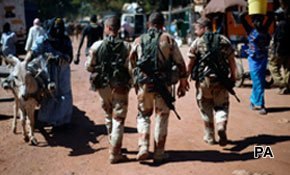John Humphrys asks: at a time of tightened spending on defence and of big cuts in army numbers, is Britain in a position to tackle terrorism?
The bloody hostage crisis in Algeria and French military intervention in neighbouring Mali have reminded us that the threat from Islamic jihadists has not gone away. It has merely changed location. The Prime Minister says the threat is “large and existential”. He says: “We must frustrate the terrorists with our security. We must beat them militarily.” But at a time of tightened spending on defence and of big cuts in army numbers, are we in a position to do so?
It is still not known exactly how many British nationals died in the aftermath of the attack on the gas installation in southern Algeria by a group known as al-Qaeda in the Islamic Maghreb (AQIM). Three certainly did and another three are thought likely to have been killed. In all, forty eight hostages died along with most of the terrorists. It is the worst loss of life linked to Islamic jihadists for a long time.
There is no doubting how seriously David Cameron’s government takes the threat. The Prime Minister dropped everything, including his long-trailed speech on Britain’s future relationship with the European Union, to deal with it. He said: “This is a global threat and it will require a global response. It will require a response that is about years even decades rather than months.” He later told the House of Commons: “Together with our partners in the region, we are in the midst of a generational struggle against an ideology which is an extreme distortion of the Islamic faith, and which holds that mass murder and terror are not only acceptable but necessary.” He said we needed “to close down the ungoverned space where they thrive with all the means that we have.”
Inevitably, many people have compared this reaction to Tony Blair’s response to 9/11 which led to British military involvement in the invasion and occupation of Afghanistan. That occupation still carries on over ten years later.
Some suggest that Mr Cameron may be overestimating this new threat. They say there is nothing ‘existential’ about it, however brutal and barbarous the actions by AQUIM have been. According to Shashank Joshi of the Royal United Services Institute, a military and intelligence think-tank, AQIM has until recently at least been no more than “a glorified criminal outfit with rather feeble pretensions to jihad”. He goes on: “Their ability to strike soft targets in Algeria is a world apart from being able to reach on to the streets of London”. The danger of overreacting to such a threat, it’s argued, is that too heavy-handed a response risks turning small threats into big ones.
But the French think this is a risk that needs to be taken. They justified their military intervention in neighbouring Mali the previous week, involving not only air attacks but French ground troops, on the grounds that there was a real risk of al-Qaeda-linked forces taking over the north of the country and posing an ‘existential’ threat not only to the country as a whole but to the wider region. David Cameron agreed and lent the French government the use of two RAF C17 transport planes to help in the action. British military personnel (said to be in their ‘tens’) are also being sent to Mali to help train the Malian army.
The Prime Minister reported that the threat posed by Islamic jihadists in both Afghanistan and Pakistan has abated somewhat in recent years but neither he nor anyone else believes it has disappeared altogether. No one really knows what will happen after most American and other NATO forces leave Afghanistan next year. Nor can anyone yet know what the effect of the Americans’ continued use of unmanned airborne drones to target terrorist suspects in Pakistan (and inevitably often killing innocent bystanders in the process) will have on the levels of support for jihadists in the country. Furthermore, the jihadist threat continues to fester elsewhere, such as in Somalia and Yemen. So it is perhaps not surprising that the Prime Minister takes the threat so seriously and that his is broadly shared by all senior British politicians.
He was careful, however, not to suggest that the military response to jihadists was the only one. He told MPs: “We must deal with the grievances they use to garner support.” In the case of Algeria this may pose particular problems. Whereas in the rest of north Africa, especially in Tunisia and Egypt, western countries have broadly supported the ‘Arab spring’ which saw authoritarian regimes toppled and governments of Islamic fundamentalists (albeit non-jihadist ones) elected to replace them, Algeria is a different case. Twenty years ago when it seemed that free elections were likely to result in a fundamentalist Islamic government coming to power, the existing regime stopped the elections and imposed a policy of harsh repression of the Islamists that cost tens of thousands of lives. The current Algerian government shows no signs of wanting to encourage an Arab spring in the country. The ‘grievances’ Mr Cameron speaks of look likely to fester.
What’s clear, though, is that the Prime Minister certainly does not rule out greater military involvement if he judges that it is required. He spoke of the need to “thicken” Britain’s involvement in north Africa and this is widely believed to mean the greater use of special forces. For the moment at least, though, there is no suggestion that British ground forces will be deployed in either Algeria or Mali and few commentators think it likely.
More imminent may be the need to take a decision on whether to involve British forces in Syria. The endgame in the Syrian civil war (whatever it may be) may well be reached this year. Western involvement has been mooted in terms of the need to prevent even more killings: already between 40,000 and 60,000 people have lost their lives as a result of the war. But there is another reason why western governments including Britain’s may find themselves needing to look again at their reluctance to get involved. There is a powerful al-Qaeda element in the forces opposing the Assad regime. Given their attitude to the jihadist threat, as articulated by Mr Cameron, western governments will feel deeply alarmed at the prospect of Syria falling into the hands of al-Qaeda sympathisers.
But if Britain does have to start contemplating further military operations to counter the jihadist threat, will we be in a position to deliver? Defence spending is being held constant in cash terms, which means that in real terms it is being cut. Only this week 5,000 more redundancies in the army are being announced as part of a longer-term policy to reduce the size of the army from 102,000 to 82,000 by 2017 and to try to make up the difference by doubling the number of reservists to 30,000 by 2018. Both the navy and the RAF have seen their numbers cut by 5,000 each as well. The military top brass have warned of our forces being stretched to the point where they may not be able to deliver.
So an inevitable question arises. Does the “existential threat” of which Mr Cameron speaks mean that we need to look again at our defence spending?
What’s your view?
- Do you think the Algerian hostage crisis was evidence of an “existential threat” we face from Islamic jihadists or not?
- Even if you don’t think it was, do you think we do face such a threat?
- Do you think military interventions such as the French have undertaken in Mali are necessary or not?
- Should Britain be supporting the French and even doing more to help, or standing back?
- When Mr Cameron says we need to deal with the grievances jihadists use to garner support, what do you think that should involve?
- Should Britain be ready to use its military forces more widely to fight Islamic terrorism?
- Should they be used to stop a pro-al-Qaeda government coming to power in Syria?
- And do you think the threat Mr Cameron speaks of means we ought to be increasing what we spend on defence?










